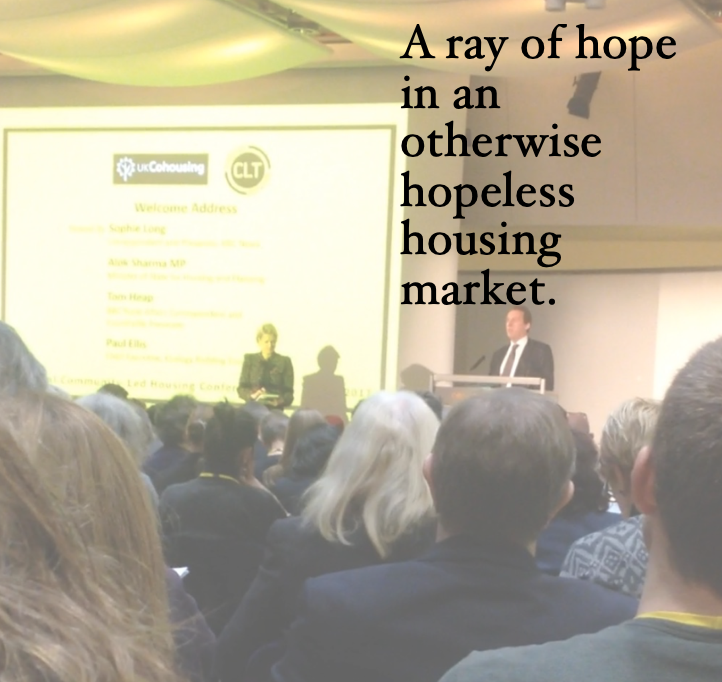
‘Hope for Housing’. The Community Land Trust Conference was just that – a ray of hope in an otherwise hopeless housing market.
To understand why this ray of hope is so important one has to realise just how hopeless the ordinary person feels, the feeling of despair at not being in control of one’s destiny, the anxiety of not being able to provide a home for the family; of being out-priced and excluded from communities individuals have been brought up in; the discomfort of having to move far from parents whose support is so valuable to young growing families and who in turn as old age creeps in need the comfort, support and care of their children.
Moreover the housing market itself appears to be monopolised by a few big developers.
Housing developments are not built with the care of the consumer in mind. It would be a revolutionary idea indeed to build homes with the care of families and communities in mind rather than maximising profits and squeezing families into the smallest space possible paying the maximum rent possible. Land and houses are often seen as investments, as pensions for old age, an income stream. We do not see land as a natural resource, as necessary to man as the air he breathes or the water he drinks. The uncomfortable truth is that as these investments become more profitable for the few so homes become unaffordable for the many particularly the young. House prices are now 6x, 10x, 18x the average wage in some areas.
The Community Land Trust provides an alternative model. It is a people powered housing solution. The idea is simple: to help people take back control: to help people and communities build their own homes with the needs of the community in mind and with prices that are truly affordable. It is an idea whose time has come and this was seen in the response to this first ever CLT conference. It was meant as a conference with 200 delegates in mind. Over 500 applied and came and many had to be turned away.
The Housing Minister Alok Shama MP affirmed his support for the movement. He spoke of the role CLTs had in building and strengthening communities. He wanted to break down the cultural barriers. In Germany and Sweden building one’s own home was the norm. Why could it not be the case here? No single measure would fix Britain’s broken housing market and the CLT had a serious contribution to make. To this end the Minister launched a new programme of funding. £60million was to be allocated each year for the next 4 years as a capital and revenue funding. Grants will be given to local authorities to allocate to community groups. Groups are invited to apply for funding and their applications will be assessed in spring. An advisory body is being set up to help those wishing to apply.
The Conference provided an arena of workshops from ethical banks offering advice and support for those wishing to invest and build homes in their communities to local councillors who have embraced the idea of communities taking back control and looking to find ways of making this more possible. This could be ideas such as the Council renting land on a long term basis for the purpose of community build, or proposing a community development with part houses at market price which pays for the houses at truly affordable rents.
Community groups can come in all sorts of shapes and sizes to meet different kinds of needs. A wonderful and inspiring video was shown of a group of older ladies who had managed to work with Barnet Council in London to build a community of small apartments. It gave these women a new lease of life and hope. They took care of each other, they met for communal meals once a week, the community provided companionship, support, conversation, gardening, cooking. These ladies knew they did not have to grow old alone. The value of this in the wellbeing of these ladies and in future savings to the NHS is probably immeasurable.
As Stephen Hill (Chair Co-housing network and Trustee of CLT) summed up at the close of the Conference: “the demand side has never had a place in housing policy making. We are the voice of the demand side. The Community Housing Fund provides an extraordinary political opportunity to scale up our influence and change the mainstream of the politics of housing. The new network of housing hubs will provide a laboratory of information, wealth of locally gathered evidence of what is needed and what works in different places. Government has never done this and it can’t do this on its own, but we can help and together we can learn how to make housing policy different.
Its time for us to become a powerful voice for making housing policies that are right for our places.”
It was a ray of hope for housing. Currently those who set up community land trusts are pioneers: they are the brave, the foolish, the risk takers. But the hope is that as interest and demand grows this area will become more mainstream with citizen and State working together to enable ordinary people to build homes that foster and replenish communities.